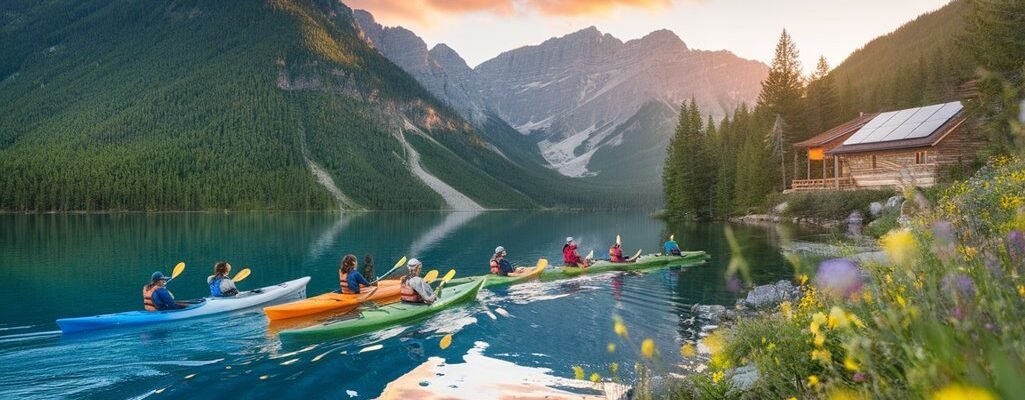
Eco-Friendly Adventure Travel Ideas for the Conscious Explorer
If you're looking to explore the great outdoors while minimizing your environmental impact, there are several eco-friendly adventure travel ideas worth considering. From sustainable hiking trails that support conservation efforts to water sports that utilize eco-conscious equipment, your options are vast. You might also think about engaging in responsible wildlife encounters or adopting green camping practices to ensure your adventures leave a positive footprint. But what about the practical tips that can truly enhance your journey? The next steps can make all the difference in your eco-conscious experience.
Sustainable Hiking Trails
When it comes to exploring the great outdoors, choosing sustainable hiking trails is a game changer. You're not just soaking in nature's beauty; you're also making choices that protect the environment. Sustainable trails minimize your impact, ensuring ecosystems remain intact for future generations.
Start by researching local trails that emphasize conservation and responsible practices. Look for those marked as eco-friendly or maintained by organizations focused on sustainability. These trails often have clear guidelines on how to tread lightly, from sticking to designated paths to avoiding littering.
You'll also find that many sustainable hiking trails lead you through diverse ecosystems, providing not only stunning views but also opportunities to learn about local flora and fauna. Engage with trail signs and guides to deepen your understanding of the environment around you.
As you hike, remember to respect wildlife and fellow hikers. Keep noise to a minimum, and always yield to nature.
Eco-Friendly Water Sports
Whether you're gliding across calm waters or navigating through waves, eco-friendly water sports offer an exciting way to enjoy nature while minimizing your environmental impact.
Kayaking and paddleboarding are two fantastic options that let you explore serene lakes, rivers, and coastal areas without disturbing wildlife. You can rent or buy equipment made from sustainable materials, ensuring your adventure is as green as possible.
If you're seeking a bit more thrill, consider windsurfing or sailing. These sports harness natural energy, relying on wind power rather than motors, which helps keep the water clean.
Look for eco-conscious tour operators that prioritize environmental conservation and practice responsible sailing.
Snorkeling can also be eco-friendly when done responsibly. Choose tours that emphasize reef protection and avoid touching or stepping on marine life.
Using biodegradable sunscreen is another way to protect delicate ecosystems while you enjoy the underwater world.
No matter which water sport you choose, always prioritize local regulations and guidelines to protect your surroundings.
Responsible Wildlife Encounters
Embracing responsible wildlife encounters allows you to connect with nature while ensuring the safety and well-being of the creatures you admire.
When planning your adventure, choose ethical tours that prioritize animal welfare and conservation. Look for operators that follow strict guidelines to protect wildlife habitats and avoid practices that exploit animals for entertainment.
Always respect the animals' space. Keep a safe distance, never feed them, and avoid loud noises that could stress them.
Educate yourself about the species you'll encounter, understanding their behaviors and habitats. This knowledge enhances your experience and fosters respect for these magnificent beings.
Opt for eco-friendly activities, like guided hikes or kayaking, which allow you to observe wildlife in their natural environment.
Engage with local conservation initiatives; your support can make a difference in protecting these ecosystems. Remember, your presence should enhance the environment, not disrupt it.
Finally, share your experiences responsibly. Use your voice to promote ethical wildlife tourism, encouraging others to appreciate nature without causing harm.
Green Camping Practices
Connecting with nature doesn't stop at responsible wildlife encounters; it extends to how you camp, too. Embracing green camping practices is essential for minimizing your impact on the environment. Start by choosing a campsite that's already established. This helps protect fragile ecosystems by preventing soil erosion and preserving local flora.
When setting up your tent, avoid trampling vegetation, and always keep your campsite clean. Bring eco-friendly supplies, like biodegradable soap and reusable utensils, to cut down on waste. Remember to pack out what you pack in, including leftover food and trash.
Consider using solar-powered lights or lanterns instead of battery-operated ones. They're not only energy-efficient but also reduce your carbon footprint. Additionally, opt for a camp stove instead of an open fire to minimize your impact on the surrounding area and reduce the risk of wildfires.
Finally, educate fellow campers about green practices. Share tips on leaving no trace and respecting wildlife. By adopting these green camping habits, you'll contribute to preserving the beauty of nature, ensuring it remains a pristine environment for future explorers to enjoy.
Low-Impact Travel Tips
When you travel, choosing low-impact options can significantly reduce your environmental footprint. Start by opting for public transportation whenever possible. Buses, trains, and shared rides not only lower emissions but also give you a chance to mingle with locals.
If you must fly, consider direct flights to minimize fuel consumption and carbon emissions.
Next, look for eco-friendly accommodations. Many hotels now focus on sustainability—think energy-efficient systems, waste reduction practices, and locally sourced food. Support these establishments by booking your stay with them.
Pack light to reduce weight and limit your need for additional transport. Bring reusable items like a water bottle, utensils, and shopping bags to cut down on single-use plastics.
When exploring, stick to marked trails to minimize your impact on natural habitats.
Lastly, engage in responsible tourism. Respect local customs, support local businesses, and leave no trace.
Conclusion
By choosing eco-friendly adventure travel options, you not only satisfy your wanderlust but also contribute to the preservation of our planet. Whether you're hiking sustainable trails, kayaking in pristine waters, or camping responsibly, each choice you make promotes conservation and respects local ecosystems. Embrace these mindful practices to ensure your adventures leave a positive impact. So gear up, explore consciously, and enjoy nature's beauty while protecting it for future generations!




